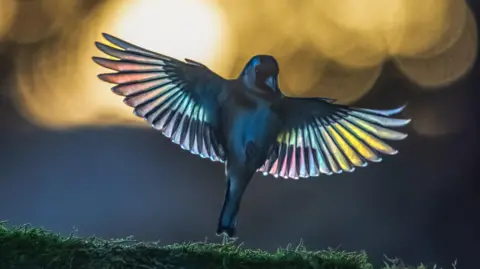Photographer Andrew Fusek Peters has dedicated the last decade to a unique endeavor, capturing the vibrant and often overlooked wildlife present in British back gardens. Through a series of personal projects affectionately dubbed “garden safaris,” Peters has documented a stunning array of wildlife, depicting the drama and daily life of creatures such as birds and squirrels. His efforts have culminated in a captivating new book, showcasing hundreds of photographs that spotlight the beauty surrounding us in our own outdoor spaces.
Reflecting on his work, Peters stated, “I wanted to celebrate the everyday stories and reveal the beauty of our birds, mammals, and insects that live alongside us.” His motivation stems not only from a passion for wildlife but also his desire to encourage a deeper appreciation for the natural world that exists in close proximity to human lives. As he explained, the majority of his remarkable photographs were taken in his modest garden and the village of Lydbury, challenging the notion that one must venture far into nature reserves or remote mountains to witness the wonders of wildlife.
Peters, however, has encountered some snobbery from more traditional wildlife photographers who often travel to exotic locations to shoot larger animals like lions and polar bears. He described these encounters, saying, “They think I’m somehow inferior because I do blue tits in the garden.” Yet Peters remains undeterred, believing that the significance of garden wildlife can be just as profound and essential as that of creatures found in the wild.
His photographic journey took a personal turn in 2018 when Peters was diagnosed with bowel cancer. This life-altering event spurred him to refine his techniques, particularly in capturing the fleeting moments of birds and butterflies. Often utilizing his kitchen as a hide, he developed methods to “make time stop,” enabling him to photograph animals at pivotal moments, such as a nuthatch taking flight with a seed in its beak, the light refracting through its feathers, creating an astonishing rainbow effect.
Within this newly published book, titled “Garden Safari,” Peters emphasizes the importance of transforming “over-manicured” gardens into wildlife-friendly havens. He articulated his belief that these spaces carry significance in the fight against climate change and biodiversity loss, declaring, “They are just as important as all the wonderful creatures of the jungle and the desert.”
The book serves multiple purposes: it is both a celebration of everyday wildlife and a call to action for individuals to foster environments that support local species. Peters states, “As we know with climate change and with what’s happening with habitat, a lot of species are really suffering, including our garden visitors, so it’s important to showcase them.”
Throughout his photographic career, Peters has captured extraordinary moments, including a rare image of a mother hare suckling her leveret—an event he noted had been photographed fewer than ten times globally. He has also ventured beyond his garden, photographing foxes in Clapham, South London, and engaging with local wildlife throughout the UK.
In addition to the intriguing stories and stunning images presented in “Garden Safari,” the book has received praise from notable figures such as Springwatch presenter Iolo Williams, who lauded Peters for making “the ordinary look extraordinary.” This recognition resonated deeply with Peters, reinforcing the value of his photographic work in highlighting the beauty of everyday wildlife.
As Peters continues his journey, he remains committed to inspiring others to appreciate and protect nature, both in their backyards and beyond. His efforts remind us that although large-scale conservation efforts are vital, the creatures living in our gardens are equally deserving of our attention and care. “Garden Safari” serves as not only a collection of beautiful imagery but also as a movement aimed at raising awareness about the essential role of urban wildlife in a rapidly changing world.



